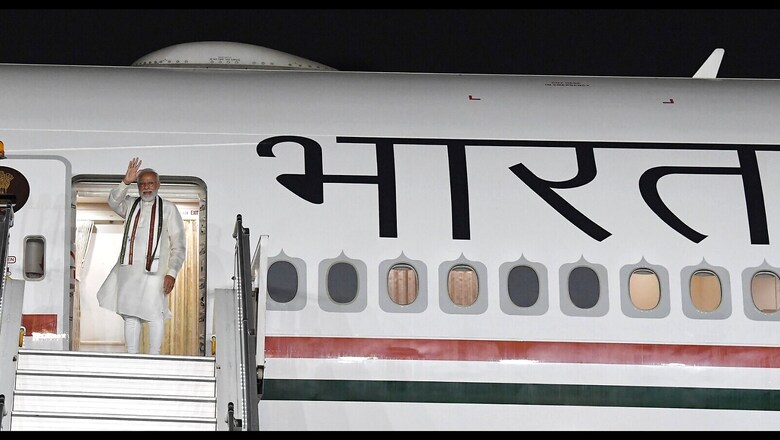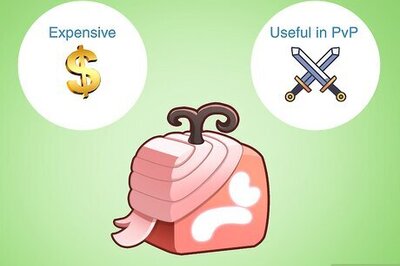
views
Prime Minister Narendra Modi landed in the German capital on Monday morning for his first meeting with Olaf Scholz, the new German Chancellor. Berlin is the first leg of his three-day, three-nation tour of Europe.
PM Narendra Modi will be visiting Denmark next for not just a bilateral meeting but also the India-Nordic Summit with Denmark, Finland, Iceland, Norway and Sweden. He will then head to France, where he will meet the re-elected President, Emmanuel Macron.
The government has said that the focus of the visit is clearly on bilateral partnerships, but all eyes are on the discussions in the backdrop of the ongoing war in Ukraine.
“I must repeat and reiterate that the principal focus of the visits and discussions is to structure and strengthen bilateral partnership across a range of areas and, of course, exchange perspective on Ukraine issues also,” new foreign secretary Vinay Kwatra said.
Germany
The country was the first among European nations to take a tough stand against the Russian invasion of Ukraine. The new chancellor, Scholz, even halted the licensing of Nord Stream 2, a critical gas pipeline for Germany from Russia, which would have benefitted working-class Germans with affordable heating to approximately 26 million homes. Since the 770-mile, undersea gas pipeline did not transit from Ukraine, the pricing would have been advantageous to Germany.
Though Germany, like other European countries, remains heavily dependent on Russia for energy, now the European Union has taken a call to drastically cut down on Russian energy dependency. In turn, the bloc also started building pressure on a country like India to not import discounted Russian oil, suggesting it would be tantamount to funding the Russian war.
India has resisted the pressure; first by clearly pointing out that the import will be no more than 1-2% of India’s total energy imports as compared to 75% natural gas imported by OECD Europe from Russia.
In the presence of UK Foreign Secretary Liz Truss, External Affairs Minister S Jaishankar called the issue a campaign against India, saying it was “natural for countries to go out in the market and look for good deals” as the price of fuel was moving northwards.
In Germany, the two sides will be part of the sixth intergovernmental consultation, a unique mechanism that brings together several ministers and officials from both sides to engage in bilateral discussions, culminating in a plenary session which is chaired by the Prime Minister and the Chancellor to “review, take stock and assess the cooperation between the two countries across a range of area as also to identify fresh areas of partnership,” said the Foreign Secretary.
In the plenary session of the IGC, the focus on cooperation is along three aspects — foreign affairs and security, economic/financial policy, scientific and social exchange and finally climate, environment, sustainable development and energy.
Denmark
In Denmark, Prime Minister Modi would hold the third summit-level interaction with the Danish Prime Minister and the discussions will focus on bilateral issues. This will be followed by the second India-Nordic summit.
Before the start of the summit, the Prime Minister will also hold bilateral summit meetings with the leaders of Norway, Sweden, Iceland, and Finland. The only other country that the Nordic nations have a summit-level meeting with is the US, hence the meeting assumes great significance.
As per the Ministry of External Affairs, India’s partnership with Nordic countries is structured around four to five clusters — green partnership; the entire space of digital and innovation economy; economy, trade and investment linkages; sustainable development; and the partnership relating to the Arctic region.
However, here too, the Ukraine crisis could figure in talks, especially because two of the Nordic nations, Finland and Sweden, that so far had stayed away from NATO, are now showing an inclination towards it. NATO has been one of the issues of contention quoted by Russia in the current crisis. The eastwards movement of NATO towards the Russian border is unacceptable to Russia in terms of security.
France
The Prime Minister will be holding his first meeting with French President Emmanuel Macron after the latter’s his re-election in a tight contest. The relations between the two countries have deepened over the past several years, with the Rafale deal taking the defence cooperation further ahead.
“India-France friendship and strategic partnership has seen a great momentum, thanks to the leadership of Prime Minister Modi and President Macron as also their close friendship. Prime Minister’s visit to France will provide an opportunity for us to carry forward the high level engagement between the two countries, post the French presidential elections as you know both countries have continuously nurtured and delivered on the ambition of their strategic partnership,” Foreign Secretary Kwatra said.
President Macron has played a significant role in trying to mitigate the humanitarian strife in Ukraine. The first humanitarian corridor was opened during the war in Mariupol after a call by Macron to Russian President Vladimir Putin, but the corridor was soon shut due to ceasefire violations.
Putin had declared war on Ukraine one day after a call with Macron on February 20 in which the French President said he would broker a summit between Putin and US President Joe Biden if Russia didn’t invade Ukraine.
Though the two have not had a call since March 29, Putin did congratulate Macron on his victory. As per Kremlin, he sent a message saying: “I sincerely wish you success in your state activities, as well as good health and wellbeing.”
It is, therefore, not hard to guess that even with the French side, the Ukraine issue will be up for discussion.
India says it has already made its stand clear – it has asked for an immediate cessation of violence, condemned civilian killings and urged for diplomacy and dialogue to resolve the crisis. It is this message that will once again be communicated during the PM’s Europe visit.
Read all the Latest India News here




















Comments
0 comment